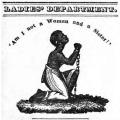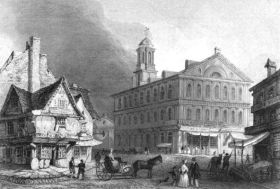45. Unnatural Causes: Hosea Easton’s Treatise
Hosea Easton’s Treatise provides an overlooked but fascinating theory of race and racism.
Themes:
• G.R. Price and J.B. Stewart, To Heal the Scourge of Prejudice: The Life and Writings of Hosea Easton (Amherst: 1999).
---
• B. Dain, A Hideous Monster of the Mind: American Race Theory in the Early Republic (Cambridge MA: 2002).
• S.G. Hall, A Faithful Account of the Race: African American Historical Writing in Nineteenth-Century Writing (Chapel Hill: 2009).
• G.R. Price, "Hosea Easton: Forgotten Abolitionist 'Giant'" in M. Morrison (ed.), The Human Tradition in Antebellum America (Wilmington: 2000), 147-163.
• E.S. Pryor, "The Etymology of Nigger: Resistance, Language, and the Politics of Freedom in the Antebellum North," Journal of the Early Republic 36 (2016), 203-45.
• J.B. Stewart, Abolitionist Politics and the Coming of the Civil War (Amherst: 2008).







Comments
New book on Hosea Easton and the extended Easton family
I just became informed of the existence of this remarkable and illuminating podcast and thank you for putting this all together and making it freely available on the internet. As the co-author, with James Brewer Stewart, of the first book on Hosea Easton, which I am thankful that you cite here, I am very pleased to see more scholars and thinkers taking notice of the work of this important and neglected American philosopher and social activist.
Your listeners might like to know that just recently I published a new multi-biographical book on some significant members of the Easton family, including a new biographical chapter on Hosea Easton that deals in more depth on the social, historical and personal context behind his philosophical views, including the several significant shifts in viewpoint to which the narrator of this podcast gives cogent and insightful notice. One example is how the complex ancestral and community dynamics of the Easton family, which involve the intersection and intermixing of Native American, African and European peoples, contributes to Hosea Easton's insistence upon an "American," rather than "African" identity, along with his philosophical rejection of the prevailing social construct called "race." Here is a link to the web page on the book, with a detailed description of its contents:
https://learningearthways.net/2020/06/20/my-new-book/https://learningea…
In reply to New book on Hosea Easton and the extended Easton family by George Price
Eastons
Thanks for getting in touch and for this link! A good example of the fact that all these figures we have touched on have much larger stories and are worthy of further exploration.
Add new comment